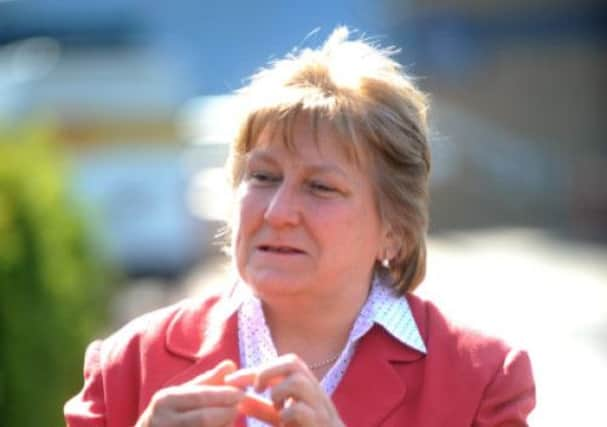Euan McColm: Goldie’s peerage and democracy


Goldie – Bella – is one of very few MSPs regarded with both affection and respect by those at Holyrood who reject her politics. Even Alex Salmond is a member of the fan club. The First Minister recognises Goldie’s political skills and admires her intellect. And he doesn’t do that with many people.
So, when it was announced last week that the West of Scotland MSP had been made a working peer, there was a ripple from left to right of “good on her”. The private goodwill of members of the Scottish National Party came with a caveat: they were pleased for Goldie, personally, but continued to reject the House of Lords as undemocratic.
Advertisement
Hide AdAdvertisement
Hide AdThe SNP refuses to nominate candidates to an unelected second chamber. It’s a solid position that’s endured through years of supposed Lords reform. As we look at the lists of men and women who’ve suddenly been gifted the right to legislate – and claim £300 a day – doesn’t that seem the only truly principled stance?
While we might find any number of people of many and varied political positions who believe Baroness Bella will be an asset to the House of Lords, the fact remains that her appointment has nothing to do with democracy.
Among the new intake to the upper house are three Scottish peers. Goldie is joined by former Liberal Democrat MSP Jeremy Purvis and businessman and Labour Party donor Willie Haughey. All of them were nominated by party leaders despite promises of reform – stretching back for decades – that would see democracy introduced to the process.
There has, of course, been reform of sorts. The 1997 Labour Government made some progress, removing the majority of the House of Lords’ hereditary peers. But progress has been desperately slow.
For all of its new-dawn-people’s-politics schtick, New Labour could not find it in itself to create an elected second chamber. Instead, we were to be satisfied that a system where members were appointed – in numbers roughly proportionate to the political make-up of the House of Commons – was fair and democratic.
By 2006, that idea had been comprehensively rubbished. The cash-for-peerages scandal led to a police investigation into allegations that a number of wealthy Labour Party donors had been made life peers as a result of their financial support. Although the Crown Prosecution Service announced in 2007 that no charges were to be brought, public confidence in the Lords was damaged terribly.
The answer was – what else? – more reform. Things would really be different. We were to have a mix of elected members and peers appointed by an independent commission, then it was to be entirely elected, then nobody really knew, then Labour lost the 2010 General Election.
During that year’s campaign, the Conservative and Liberal Democrat parties pledged radical changes to the House of Lords. Deputy Prime Minister Nick Clegg introduced a bill last June that would finally reform the Lords. Then his Tory partners in the coalition scuppered it. And that was the end of that.
Advertisement
Hide AdAdvertisement
Hide AdIt’s almost as if there’s no real will to democratise the Lords when it’s such a convenient way of rewarding cronies, bag carriers and sugar daddies.
This weekend the SNP has unleashed some righteous indignation in the direction of the upper house. The party points out that 30 new life peers brings the tally of unelected politicians to almost 800. The nationalist accusation that the House of Lords is “an affront to democracy” might be a predictable soundbite, but isn’t it valid, nonetheless?
Reform of the second chamber has seen a system of privilege replaced by a system of patronage. If we consider that the privilege of old was a consequence of historic patronage, then we’ve not moved far at all.
Cynics will say that it’s easy for the SNP to take a principled stance when its relatively small number of MPs would make it eligible only to nominate a couple of peers. Party strategists believe the “radical edge” suggested by the boycott is of greater value than the ennobling of two or three loyal party servants.
But, that calculation aside, the SNP’s position remains one that answers the concerns of anyone who thinks voters have a right to choose the men and women who make our laws.
If you’ll indulge some idle speculation, I wonder if a fully elected upper house – should it ever become a reality – might have a significant number of Scottish Nationalists. We know from results in Holyrood and Westminster elections that Scots are comfortable changing allegiances depending on which parliament they are being asked to populate.
I wonder if there might be something in the Scottish psyche – if such a thing exists – that would see us send members of one party to the Commons and members of another to the Lords in the interests of keeping our MPs in check.
Until the day comes (and I’m not convinced it will come at all soon) that the members of the House of Lords are elected, the Scottish Nationalists will remain on the outside. And, until then, we’ll continue to see people we didn’t choose given the power to influence our legislation.
Advertisement
Hide AdAdvertisement
Hide AdPurvis, Haughey and Goldie may well be fine, public-service-driven sorts. Perhaps they will enhance the work of the Lords and, thus, enrich our Houses of Parliament. In Goldie’s case, I’m willing to predict that will be the case. But she’ll take her seat without the slightest contact with the voting public.
Baroness Bella will make her mark on the House of Lords, of that I have no doubt, but wouldn’t it be preferable if she was to do so thanks to a democratic mandate? «
Twitter: @euanmccolm